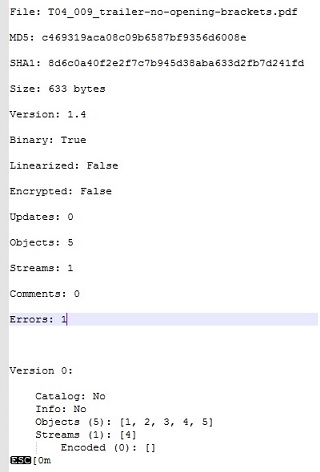Difference between revisions of "Peepdf"
(Trial import from script.) |
Ania Molenda (talk | contribs) |
||
| (5 intermediate revisions by 2 users not shown) | |||
| Line 1: | Line 1: | ||
| − | {{ | + | {{Infobox tool |
|purpose=peepdf is a Python tool to explore PDF files in order to find out if the file can be harmful or not. | |purpose=peepdf is a Python tool to explore PDF files in order to find out if the file can be harmful or not. | ||
| − | |||
|homepage=http://eternal-todo.com/tools/peepdf-pdf-analysis-tool | |homepage=http://eternal-todo.com/tools/peepdf-pdf-analysis-tool | ||
|license=GNU GPL v3 | |license=GNU GPL v3 | ||
| − | | | + | |function=Metadata Extraction |
| + | |content=Document | ||
}} | }} | ||
| + | {{Infobox tool details | ||
| + | |ohloh_id=peepdf | ||
| + | }} | ||
| + | = Description = | ||
| + | From the peepdf homepage: | ||
| − | + | peepdf is a Python tool to explore PDF files in order to find out if the file can be harmful or not. The aim of this tool is to provide all the necessary components that a security researcher could need in a PDF analysis without using 3 or 4 tools to make all the tasks. With peepdf it is possible to see all the objects in the document showing the suspicious elements, supports all the most used filters and encodings, it can parse different versions of a file, object streams and encrypted files. With the installation of Spidermonkey and Libemu it provides Javascript and shellcode analysis wrappers too. Apart of this it is able to create new PDF files and to modify existent ones. | |
| − | |||
| − | |||
| + | = User Experiences = | ||
| + | After downloading the tool [http://eternal-todo.com/tools/peepdf-pdf-analysis-tool Download Page] you can just open the command line from any folder on your machine with PDF files in it and type e. g.: | ||
| − | + | ''folderWithPeepdfInIt\peepdf.py -l nameOfPdfToanalyse.pdf'' | |
| − | + | ||
| + | You can also create an output file (e. g. output.txt),it will appear in the folder of the PDF you are examining. | ||
| − | peepdf | + | ''folderWithPeepdfInIt\peepdf.py -l nameOfPdfToanalyse.pdf > output.txt'' |
| − | + | An output might look like this: | |
| + | [[File:Screenshot_peepdf_findings.jpg]] | ||
= Development Activity = | = Development Activity = | ||
| − | |||
| − | |||
| − | |||
Latest revision as of 15:05, 26 April 2021
Description
From the peepdf homepage:
peepdf is a Python tool to explore PDF files in order to find out if the file can be harmful or not. The aim of this tool is to provide all the necessary components that a security researcher could need in a PDF analysis without using 3 or 4 tools to make all the tasks. With peepdf it is possible to see all the objects in the document showing the suspicious elements, supports all the most used filters and encodings, it can parse different versions of a file, object streams and encrypted files. With the installation of Spidermonkey and Libemu it provides Javascript and shellcode analysis wrappers too. Apart of this it is able to create new PDF files and to modify existent ones.
User Experiences
After downloading the tool Download Page you can just open the command line from any folder on your machine with PDF files in it and type e. g.:
folderWithPeepdfInIt\peepdf.py -l nameOfPdfToanalyse.pdf
You can also create an output file (e. g. output.txt),it will appear in the folder of the PDF you are examining.
folderWithPeepdfInIt\peepdf.py -l nameOfPdfToanalyse.pdf > output.txt
An output might look like this:
